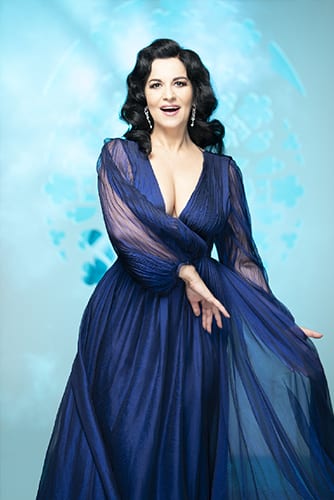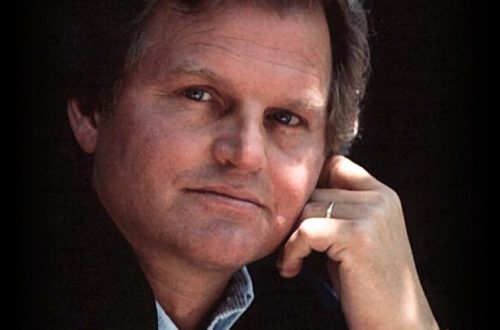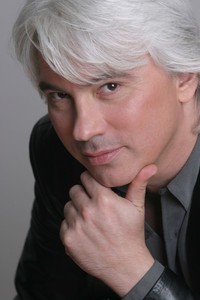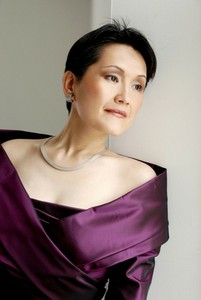
Angela Gheorghiu |
Angela Gheorghiu
The triumph of Angela Georgiou in the film “Tosca”
Angela Georgiou is beautiful. Possesses magnetism on stage. So one of the queens of bel canto has now become a film actress. In the film-colossus based on the opera by Puccini, signed by the name of Benoit Jacot.*
The Romanian singer skillfully “sells” her own image. She sings, and the advertising machine thinks about comparing her with the “divine” Kallas. There is no doubt – she has an “iron” vocal technique. She interprets the famous aria “Vissi d’arte” with due impulse of feeling, but without exaggeration in a veristic style; in the way he treats the pages of Rossini and Donizetti, with the right balance between the aesthetics of feeling and the condescension towards models in neoclassical taste.
But the strongest side of Angela Georgiou’s talent is acting talent. This is well known to her numerous admirers – the regulars of Covent Garden. In France, it is a huge success, sold out on video cassettes.
The fate of this Tosca, fortunately, is not like the fate of many operas transferred to the movie screen. This film seems to be distinguished by an aesthetic novelty: a refined compromise between the spirit of cinema and the spirit of opera.
Riccardo Lenzi talks to Angela Georgiou.
– Shooting in the film “Tosca” became an unforgettable fact of your life, Mrs. Georgiou?
– Undoubtedly, working on this Tosca was very different from working in the theater. It is devoid of that typical aura that does not allow you to make a mistake. A situation according to the proverb “either make or break”: the exclusive advantage of the “animals of the stage”, to which I belong. But this work also means achieving a goal for me.
I think that thanks to cinema, opera can be discovered and enjoyed by the broadest masses of the public. However, I have always loved opera films. I do not mean only such recognized masterpieces as Joseph Losey’s Don Juan or Ingmar Bergman’s Magic Flute. Among the cinematic versions that have fascinated me since my youth were the popular film adaptations of operas starring your Sophia Loren or Gina Lollobrigida, which limited themselves to imitating prima donnas.
– How does the stage interpretation change when it comes to fixing it on film?
— Naturally, close-ups make facial expressions and feelings obvious, which in the theater can go unnoticed. As for the problem of timing, the shooting, in order to achieve a perfect match between the image and the vocal, can be repeated several times, but, in fact, the voice must be expelled from the throat in the same way, according to the score. Then it was the director’s task to implement combinations of close-ups, flash-back, filming from above and other editing techniques.
How difficult was it for you to become an opera star?
– Everyone who was next to me invariably helped me. My parents, friends, teachers, my husband. They gave me the opportunity to think only about singing. It is an unthinkable luxury to be able to forget about the victims and to best express their abilities, which subsequently turns into art. After that, you come into direct contact with “your” audience, and then the consciousness that you are a prima donna fades into the background. When I interpret Longing, I am fully aware that all women identify with me.
– What is your relationship with your husband, the famous Franco-Sicilian tenor Roberto Alagna? “Two roosters in one chicken coop”: have you ever stepped on each other’s toes?
In the end, we turn everything into an advantage. Can you imagine what it means to study the clavier at home, having at your disposal one of the best – no, the best singer of the world opera stage? We know how to emphasize each other’s merits, and each of his critical remarks for me is an occasion for ruthless introspection. It’s as if the person I love was not only Roberto, but also an operatic character: Romeo, Alfred and Cavaradossi at the same time.
Notes:
* Tosca premiered last year at the Venice Film Festival. See also the review of the recording of “Tosca”, which formed the basis of the soundtrack of the film, in the “Audio and Video” section of our magazine. ** It was in this theater that in 1994 the triumphant “birth” of a new star took place in the famous production of “La Traviata” by G. Solti.
Interview with Angela Georgiou published in L’Espresso magazine January 10, 2002. Translation from Italian by Irina Sorokina





